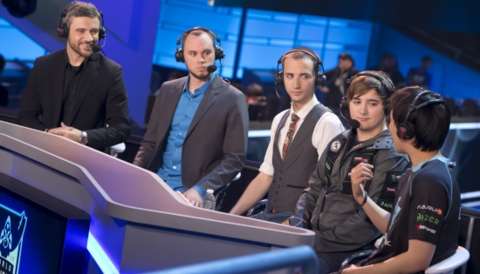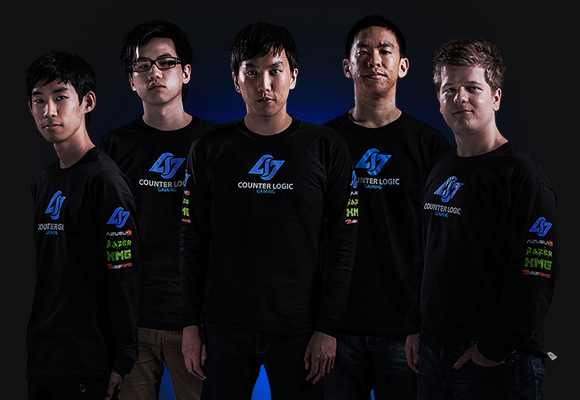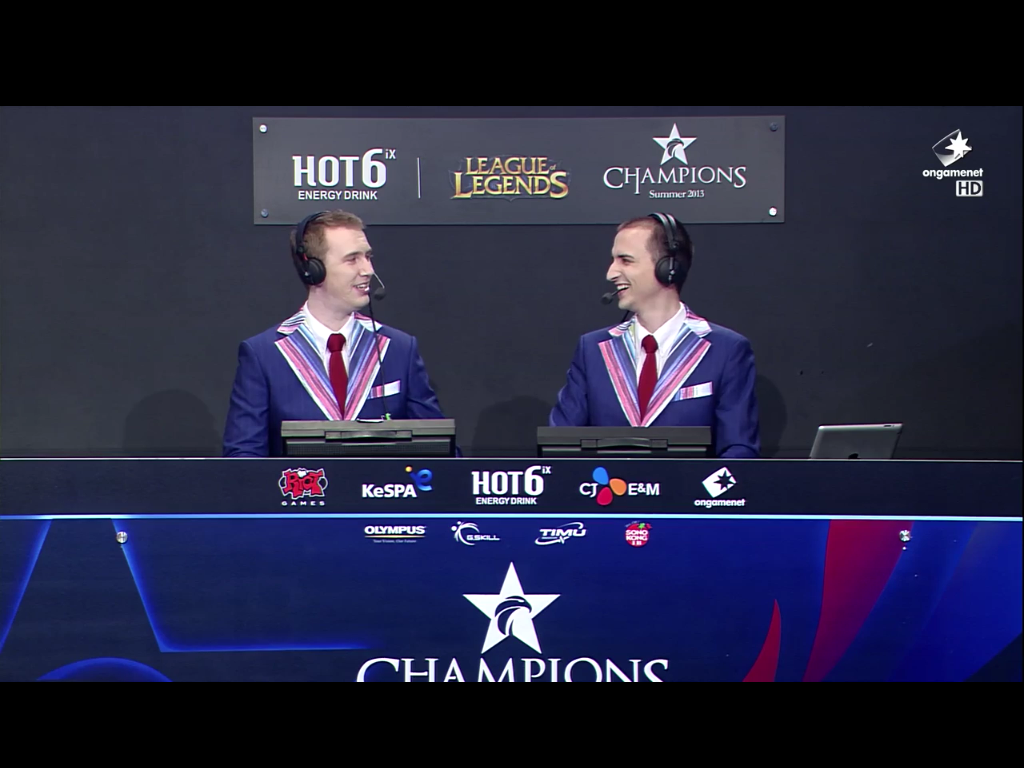Interview with Christopher 'MonteCristo' Mykles
“I don’t actually fully believe in the Korean [coaching] method,” MonteCristo explains as he discusses CLG and working as a coach.
This article was originally published on GameSpot's sister site onGamers.com, which was dedicated to esports coverage.
Christopher 'MonteCristo' Mykles is the english commentator for OnGameNet’s League of Legends Champions league and the is also the coach of North American LoL team Counter Logic Gaming. His insight on both the Korean and North American LoL scenes qualifies him as one of the individuals capable of talking about coaching at length.
onGamers had the privilege of sitting down with him and asking him questions at length about his job at CLG.
onGamers: So, let’s step back to July when you were added to CLG as their coach. How did this come about? Did CLG reach out to you?
MonteCristo: I’ve been a friend of the team for a long time, I had gotten to know CLG initially through interviews with players and teams at events for ggChronicle before I went to Korea. So, I became friends with George and Kelby and through personal conversations that we had it became very clear that our vision of esports was pretty tightly aligned. It was something that was pretty loosely discussed for a long time and then the need [for having a coach] became more evident within the team. So, the players and management all agreed that I would be a good choice, and I was very interested because I’ve been wanting to get into coaching for a long time. It was more of a situation of everyone coming together and everyone knowing each other than one thing that I could particularly point to.
Before joining the team, what challenges did you assume would stand in your way, specifically with CLG?

I must admit that I had some initial concerns and was kind of tentative about working with some of the players like Chauster for being stubborn or unwilling to accept criticism or help. But what I found actually was that everybody was really willing to work together to get better and was capable of listening and willing to listen. So it was actually a lot of my initial concerns didn’t even matter and I was really pleasantly surprised by that. From my perspective I think one of the things that was a challenge for me was coming in partway through a season and also coming in when I didn't have any control over the roster.
So a lot of the decisions about lineup and roster had already been made and those weren't things that I had been a part of. So it was more like working with the hand that had been dealt to me rather than having any kind of control over that. Obviously, that’s changed now after the season and looking forward into the future.
With the roster changes at the end of the season for CLG, what role did you play with things like removing bigfatlp from the team and finding replacements?
I played a major role, I’m the coach of the team! It was me, the players and the management all having discussions about what was going to happen and what we wanted the team to look like and who out of available players was interested in getting on the team and also who was going to be the best fit for the style we were trying to develop.
When any player is asked the question, “Why is Korea so much better when compared to North America or Europe?” They love to say something along the lines of “Differences in infrastructure.” without really explaining how it’s different. What are the key differences between Korean infrastructure and North America’s?
Well obviously, it varies widely from team to team in Korea. It’s not like just because you’re a team in Korea you have all the same advantages in terms of infrastructure. What we’re really talking about when we discuss infrastructure is the difference between top teams in Korea and the rest of the world. Just take last night, Samsung Ozone was playing against CJ Frost. Samsung Ozone had four coaches there in the studio and they had Homme. So they had a substitute player and four coaches, and Homme has kind of moved more into a coaching role at this point. He still plays occasionally of course but typically I see him there kind of there with the players always talking to them and helping them out. So, it’s just the number of coaches you have on a team and the level of management that sets those Korean teams apart. They just have more resources available as well, when you have a multi-billion dollar companies like CJ and SK Telecom, KT and Samsung backing up a team they can really take care of everything. You know, we’re working towards this with CLG, and I observe the other western teams, but without really knowing their situation I don’t really want to talk to that. But, for CLG, we now have two managers in the house, we have HotShot to helping out the players with specific mechanical issues and lane matchups. Then you have me aswell, who is on Skype with them for hours and hours everyday. So we now have basically four support staff members to help out the players. I think we are getting close to that Korean infrastructure within CLG, we definitely have more staffers than any team in North America. So, we’re just trying to develop a support system for the players in order for them to perform at their best. In Korea, they also have housekeepers and cooks in the team house so they never have to worry about anything at all. We’re currently looking into that with CLG and getting a cook is a really high priority for me so I can control the players diets and make sure they’re eating well. As well as eliminate any concerns for them about if they’re going to have a good meal, and I don’t want them playing hungry and all that other stuff.

So, you think the key thing that North America needs is just more staff in general?
Precisely. You need good management and you need good analysis. And, you need somebody who can serve more as an emotional leader of the team. That’s also where Korea come in really big because there are coaches in Korea that have been doing this for a decade. They’ve been around since the early days Brood War. So, there’s just nobody with that experience to be that kind of a coach in the west because nobody in the west has been full time coaching an esports team for ten years. That just doesn't exist. Also, you can look at other factors too, like we don’t have somebody like Reach, who coached the Najin team that was a major player in Brood War. Who has the experience of being a champion and understanding that mentality. Who is now older and has life experience as well to come back and coach younger players. There are very few people like that in the west. It’s really difficult to catch up to their level of knowledge. I mean, I am by no means a perfect coach and I’m still learning how to do it. I’m not even in the team house which of course hurts. So, we’ve got a long way to go. Also, in the west, I’m older, I’m 27. So I have a lot more life experience than my players and to be a coach you have to be respected. So if you are 21 years old, you’re probably not going to win the respect or have the control over the players that you need, to be an effective coach. Because I am able to have a career in the industry at my age and I’m still available to coach albeit remotely, there aren’t that many people who can do that either because if you’re 27,28 or 30 you’re not going to drop everything and move into a team house right now. You need somebody you can be there in terms of career and there just aren’t the salaries for coaches in the west like there are in Korea to justify someone older going into that position.

Let’s bring it back to CLG. Before their match against Alternate, you and the players seemed confident that CLG would take the match. Doublelift even said that they crush people in scrims. Why aren’t results from scrims transferring over?
I wish I knew the answer to that, or I feel like it would’ve been solved already. Battle of the Atlantic, for me as a coach, was extremely frustrating. I don’t mind if the team loses as long as I see improvement, but what happened with the team was that all of the things we were working on went back to square one in those games. It was really upsetting for me as a coach because we had been spending all this time, putting months and months of work into these issues and the all of a sudden when they appear to be gone in our scrims, they all of a sudden just re appear in a competitive match. I’m still trying to work out why and how that happened.
After the match, you said that you talked with HotShot and plan to dramatically change the training schedule. What does that entail? What was weak about the regiment previously?
I don’t know if there were really weak points in what we had set up before, it just wasn’t having the desired effects for whatever reason. We had built in some differences in terms of practice schedules for the players. Basically, the big change is that we now want to scrim more than we did before. Typically, teams have 2 hour scrim blocks, that’s how NA practices. We were doing 2, but now we're boosting to 3, at the expense of solo que so it’s a bit of a rebalance right there. Also, it just in terms of how the players train. We decided to implement a new kind of journaling system for the players, so it’s kind of a requirement to update goals and describe specific areas that need improvement everyday and kind of focus on a very small level to improving one or two aspects of gameplay a day either decided by me or HotShot or the team itself as to what players need to work on. So, we want them to put it into writing in order to better focus on that goal and commit it to memory. It’s not like stupid broad things like, “I need to make my rotations better” we want to focus on very specific things like “ I want to work on roaming from top to mid lane before 15 minutes”. So we think that this kind of practice will better focus the players on to looking for those kind of opportunities and adding specific skills to their repertoire. We want them to work on that for an entire day, or two days until they get it right and incrementally improve piece by piece based on that. So thats what our new focus is in terms of mentality and work of writing and describing during scrims and trying to make our practice more effective.
You also said “There are no eSports coaches to learn from in the West.” With that in mind, where specifically do you take inspiration from to craft a training regime for the team?
Well, I do have access to the Korean coaches who I talk to, and many of them have put up impressive results. I look at what they do and look at how they talk about the game and think about why they do things. With that said, I don’t actually fully believe in the Korean method. I actually think that they over practice, and that doesn't leave enough time for breaks. We’ve seen a lot of psychological studies that say that breaks are very important to processing information and actually learning when you have that downtime it becomes a lot easier to commit what you’ve already learned to memory instead of just practicing for the sake of practicing and developing bad habits and being unable to break out of them, or just going on autopilot. So, I value breaks very highly. Also, based on what Reach does with the Najin teams, I really believe in team building and playing other games in order to have the team still be competitive, because we’re talking about competitive players here, but do it in a more friendly, less stressful way. Because League is very stressful for the players clearly, it’s their job and they’re expected to preform. If you can play other games that appeal to these competitive people than you can just build the team that way, by building synergy and communication or build friendship in a way that's less stressful than constantly playing League of Legends all the time. So, I’m p lanning when I get back to LA, to live in the CLG house for a couple weeks and work heavily on that with the team.
What are your goals for improving your coaching methods?
My goals are definitely talk to more coaches about what they do, being back at the LCS in North America and checking in with the other coaches and seeing how things are going for them because its important as a region that all the coaches talk and share ideas. I think about methodology, I just continue to talk to the Korean coaches as well and I need to read some more books about coaching and learn about it from the perspective of other sports and see what I can do to apply traditional sports coaching methodology to traditional esports.
What is the biggest challenge of remote coaching, rather than living in the gaming house. What kind of benefits do you get from living in a gaming house with the team?
It's really immensely beneficial to be in the gaming house because as a coach you are also responsible for the emotional well being of the team. Since I’m not there living day to day it’s hard for me to get a real read on player emotions and it works a lot better when you’re in the room and you can say “don’t treat your teammate like this” or “You seem to be a little upset, hows it going, what can we do to talk about this”. So it’s really difficult to get an emotional read on the players and solve those situations when I’m not there all the time. Because I’m not there all the time I miss a lot about if there is a problem with the team’s dynamic, or if there is an issue that crops up between players when they’re not scrimming, then frequently I’m not aware of it. So I rely on the players to talk to me individually if those issues occur so I can help to smooth things out. It’s significantly harder, I would say. It’s harder to be more of an authority figure and get things done and keep everyone on track. Due to the fact that I'm remotely coaching, they can kind of dick around on their computers and I won’t know about it because I can’t see it. Where as if I was in the room, its a lot easier to slap them around if they start getting distracted.
Right before we go, I want to get your predictions for who you think will be in the OGN final, and what the score will be.
*groans* Oh man. I think Ozone is definitely going to be in the final. The other side, my head says SK Telecom but my heart says KT Bullets. I’m such a KT Bullets fan, they’re my favorite team. But I’d say SKT vs Ozone is the most likely. 3-1 SKT.
Image Credit: lolesports, OGN
Got a news tip or want to contact us directly? Email news@gamespot.com
Join the conversation